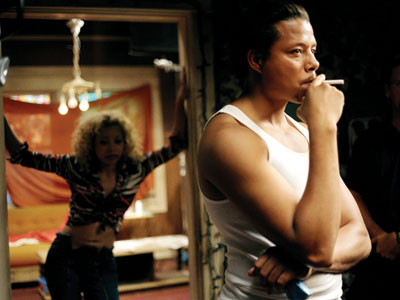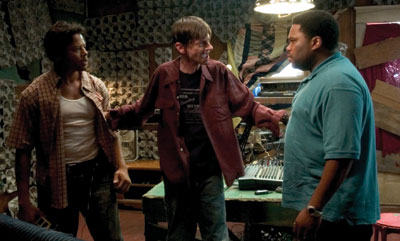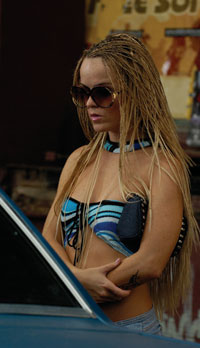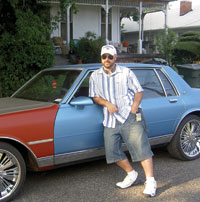PLAYER’S BALL
Craig Brewer won the Audience Award at Sundance with Hustle & Flow, his gritty love song to the Memphis rap scene and the creative spirit.
BY SCOTT MACAULAY
 |
| Terrence Dashon Howard in Craig Brewer’s Hustle & Flow.
PHOTOS: ALAN SPEARMAN/CRUNK PICTURES |
He’s a born storyteller,” says producer Stephanie Allain of Craig Brewer, writer-director of this year’s Sundance smash Hustle &Flow. Indeed, even before I’m able to turn on my tape recorder, Brewer, sensing that I’m a music fan, is off on a fast-paced riff about Al Kapone, Eightball and MJG, some of the Memphis rappers he’s slipping into the Hustle soundtrack before the film hits the theaters. The riff segues into a long story about the Memphis recording studios Stax and Sun, the places where Otis Redding, Elvis Presley and Howlin’ Wolf recorded so many of their hits. Ike Turner was on his way to record at Sun, Brewer told me, when a cop car pulled him over and his amp fell off his overpacked van and busted.
“So Sam Phillips started shoving newspaper inside the amplifier to deaden the distortion,” Brewer recounted. (At this point I had my recorder on.) “And it’s now that sound on ‘Rocket 88.’” Everybody says that’s the first rock ’n’ roll record because of that distorted guitar sound. After that, everybody tried to basically duplicate a mess-up, tried to get back to that distorted sound of Ike’s fuzzy amp. That’s history in Memphis — how Ike Turner arrived at Sun with a busted amp.”
Beat.
“I wanted to make a Memphis movie,”Brewer then says as we slide into a conversation about local flavor, embracing limitations and his little character-based movie that won big at Sundance. When it premiered in competition in January, it nabbed the Audience Award, scored a $10 million advance from Paramount/MTV and inspired the enthusiasm to warrant a 1,200-screen summer release. It also generated apocryphal Sundance tales of its own, like producer John Singleton whipping out his checkbook to pay for the production and the late-night bidding war among the very studios that passed on the pic at the script stage.
But if there’s a lot of hype surrounding Hustle & Flow, the movie more than justifies it. Although this is only his second film — his first was the no-budget DV film that got him noticed by Allain — Brewer has a pitch-perfect command of performance, pacing and drama. He’s not afraid of putting big emotions onscreen, creating a series of crowd-pleasing moments that make this very local tale of a Memphis pimp trying to transform his life by recording rap music into something more universal. The film is also very smart, smart about the way music (and, by extension, film) is originated, and smart about the relationships and interpersonal dramas that surround anyone trying to become a star.
If Brewer is this year’s Sundance sensation, though, in person he doesn’t show it. Affable and unpretentious, Brewer is a real movie lover who is now heading back to Memphis to make his third film, Black Snake Moan, which, even though it stars Samuel L. Jackson and Christina Ricci, sounds very independent. With a title from a 1920s Texas blues record by Blind Lemon Jefferson, it’s about an insatiable young woman whose husband leaves for military service in Iraq and an itinerant bluesman determined to reform her.
 |
| Left to right: Terrence Dashon Howard, DJ Qualls and Anthony Anderson in Hustle & Flow. |
FILMMAKER: Your film was perhaps the biggest hit at Sundance, but it had its detractors. What is it about the film that pushed some people’s buttons at the festival?
CRAIG BREWER: Well, I think there are a couple of reasons. One is that there are issues of misogyny [with the lead character]. But at the same time [some critics were] calling him “a pimp with a heart of gold” or a “lovable pimp”! I never saw [Terrence Dashon Howard’s character] DJay as a lovable pimp; I saw him more like cats I know. They’re not walking around with gold jeweled goblets, spangles, feathers or silks; they’re just sweating their asses off alongside their girls in these cars, driving them from shake joint to shake joint. I don’t really like calling them pimps, because pimping is just one of the things that they do. I think that if you needed your house cleaned, they’d send their girls over to do that. They don’t care what they’re doing as long as they’re kind of making some money, these hustlers that I know in Memphis. So the select few who have a huge problem with Hustle & Flow, I think it’s because I don’t really pass any judgments on DJay. There’s about half an hour where the audience is going, “Is it okay if I laugh when he’s funny? I don’t necessarily dig what he’s doing. I mean, damn, he just threw a baby and a woman out on the porch after I began liking this guy!” But I have people like that in my life, you know, and they’re friends of mine. In the South we have people like that in our family. Approaching [the character] with no judgment is why I think the studios were reluctant to do the movie in the first place.
FILMMAKER: My theory is that it’s because the film fits into a genre — the A Star Is Born, Flashdance, inspirational “making it” movie — that is almost an anomaly at Sundance, where it premiered.
BREWER: It’s interesting you say Flashdance. The studios do this thing called “running numbers.” They ask you to come up with some movie that your movie is like so they can run the numbers and see how much money to spend. They kept asking me, Is your movie like Menace II Society? Is it like Boyz N The Hood? Do The Right Thing? I was like, No, this movie is like The Commitments. I really wanted to make a movie about nobodies trying to figure out a way to make music and become somebodies. I was making that too, so I feel like I have Flashdance, Footloose and Purple Rain, which was also another big movie in my life. It’s filled with music, and it is complicated. this raw texture to it. I try to There’s this moment when Apollonia brings [Prince] a guitar and says, “I’m joining Morris’s band.” And what does he do? He hauls off and smacks her. This is a crazy world this musical is taking place in, and that’s what I wanted to do too. With regard to what you were saying, [the film] is a Wizard of Oz tale, but I’ve lived a Wizard of Oz tale! Every time somebody says to me, “You’ve made kind of a clichéd, preposterous movie,” I kind of want to kick their ass because it’s like, Well, I lived that too, so I feel like I have the right. And please go back and revisit Rocky. The original Rocky is like an independent movie—it has this raw texture to it. I try to remind people that Rocky doesn’t win [the fight]. Rocky was a real model for me in that [the movie is about how Rocky’s prizefight] affects [his girlfriend] Adrian and her brother Paulie. And that’s what happened to me with my family. I went to my family and said, “I have to make this movie.” And I put my family through hell.
FILMMAKER: You’re talking about your first feature, The Poor and Hungry?
BREWER: Yes.
FILMMAKER: How was your family involved with your film?
|
FILMMAKER: Because you weren’t doing the films in a systematic way?
BREWER: I think there comes a point in every young guy’s life where he’s dreaming big and then reality really sets in. I think my dad was telling me, You know, son, let it go. And I didn’t want to let it go. So I wrote the movie, and then my dad called me and he said, “Listen, I have an idea on how you need to shoot this. You need to think of it as like a ‘black box theater’ version of a film. You need to shoot it on DV, you need to not be ashamed of the DV, you need to celebrate the DV, and you should do everything yourself. You should cut it, you should light it, and you shouldn’t get more crew members involved than you need.” This is back in ’98, before Blair Witch. So I went out and got a bunch of video camera magazines and I came home, and there was this message on my answering machine to call my dad’s work. He had passed away. He was a healthy guy and he just had a heart attack. He was 49. This was on the same day he told me all this stuff. So every day I was making that movie I had this sense of mortality that I’d never quite had before. That’s what kept me going through that movie. But it was sometimes at my family’s expense, and after that movie ended I was both relieved, proud and ashamed of myself. And that [feeling was] what I wanted to explore with the character of DJay in Hustle & Flow.
FILMMAKER: Where did you get the idea to do a film about a pimp who wants to rap?
BREWER: I was [scouting locations for The Poor and Hungry] at this one hotel that prostitutes frequented. I just wanted to rent a room, and the Chinese guy behind the bulletproof glass wasn’t feeling it. I started walking back to my car and this Chevy Caprice rolled up on me. There was this black guy in a wifebeater driving, and a white girl with microblonde mini braids just kind of dead looking at me. And he was rat-a-tat-tat hustling her on me. Wouldn’t stop. I remember saying, “No, no, I’m good,” but the pimp wouldn’t shut up. He said, “Hey, you like this car, man? I’m selling this car.” He would not stop selling. And I got in my car and I was like, Man, it’s been a day of pimping because I’ve been trying to pimp my movie — I’m trying to make this guy give me a hotel room for $30 to film a scene — and here’s this guy trying to sell this girl on me. And that’s when I started thinking about this character DJay, who essentially is dealing with the same things that I was dealing with as a low-budget DV filmmaker. I remember driving home thinking, He has to rap, because I know so many rappers in town and they’re making their rap the same way that I’m making my digital movie: They’re recording it themselves, they’re making the beats themselves, they’re doing it in their homes. It’s really raw, but that’s kind of what makes it good. They’re doing what my dad said. They’re not ashamed of the tools that they have. While making [The Poor and Hungry] we had a little shotgun house that we lived in, me and my wife, my brother-in-law and my sister-in-law, all four of us crammed into this house. And I could either have the air conditioning wall unit on or I could edit. I couldn’t do both because the power would blow out. We had to quiet down neighbors, just like in [Hustle & Flow]. We had to live really, really spare. I had to sell off my whole video collection that I had saved since I was like 15 — 400 movies. It was hard to watch that go. I remember thinking about those when the bidding war [on Hustle & Flow] was going down. Once we started making the movie my wife stopped working at the club, and we just got a lot better with ourselves. I got her pregnant, and as the movie started happening she started ballooning up just like Shug [in Hustle & Flow], and she was really our angel throughout the movie. So really, the story of DJay is the story of me and my family making this movie.
FILMMAKER: Why did you decide to move back to Memphis after working at ACT in San Francisco if you knew you wanted to make films? Los Angeles is a lot closer and would have seemingly made more sense.
 |
| Taryn Manning in Hustle & Flow. |
FILMMAKER: What happened when you finished The Poor and Hungry?
BREWER: I took the movie cassette tape to Hollywood and started meeting up with people who are, you know, six degrees away from Jerry Bruckheimer [laughs]. It’s like you start exploring leads that you just can’t believe you’re exploring. Like [somebody says], “Hey, I know a guy that knows Steven Seagal,” and you’re like, “Wow, okay.” And you don’t quite know what to do with that, but it’s a hell of a lot more than who you know. That’s what the [Ludacris character in Hustle & Flow] represents — that implausible idea of your success and your fame. It’s like, once I get my movie to this person everything will change. In the rap world too, everybody’s trying to do that. You’ve got to get your demo to somebody.
FILMMAKER: Did you submit your film to festivals?
BREWER: It went to the Hollywood Film Festival.
FILMMAKER: It didn’t go to Sundance?
BREWER: No. I didn’t give myself much credit. I took the first festival that answered, which was the Hollywood Film Festival. I didn’t know that that knocked me out of the running everywhere else. But I’m really glad that happened because I got a lawyer, Mark Litwak, and he started getting me little writing jobs. IFC picked it up and they showed it for about three years, and it played at a local movie theater for eight weeks. And I started writing again.
FILMMAKER: You wrote the script for Hustle.
BREWER: And got a really good agent named Brad Gross and a really good review of The Poor and Hungry in the Hollywood Reporter. So people started calling. My little movie, that $20,000 feature that I made, got me all of this. Stephanie Allain read the script of Hustle and bought a ticket to Memphis. She watched The Poor and Hungry and said, “You’ve got to direct it.” And by that time, to be honest with you, I had gotten some pretty firm rejections. They loved the script, they wanted to do the script, but they didn’t want me to do the script. And the reason was because I was white.
FILMMAKER: Of course.
|
FILMMAKER: Was he around on the shooting?
BREWER: He really left me alone about making the movie, but where he was expert was telling me how to make a movie with a real crew. The thing that he always pressed upon me was to “shoot the meat first.”
FILMMAKER: Did you do that?
BREWER: Well, after the first couple of days, I learned that I had to. Man alive, the day just goes! Everything may be going great, but then it rains. He really was good at teaching me those kinds of things. When to let the actor alone, when to maybe push and get angry even when you’re not, you know — how to gauge the dynamic of the set. And if we went into overtime, it was his money.
FILMMAKER: How many days did you shoot the movie?
BREWER: Twenty-three. Super 16mm.
FILMMAKER: And for how much? A little under $3 million?
BREWER: Yeah, we were making the movie for $2.8, and I think in post it went up.
FILMMAKER: At one point did you think of Terrence Howard?
 |
| Craig Brewer on the set of Hustle & Flow. |
FILMMAKER: What of Howard’s work made you think he’d be the right guy?
BREWER: I first saw him in The Best Man. But after I saw him in The Best Man, I was like, Oh, wait a minute — that’s that guy from Dead Presidents. Then I just started seeing him everywhere. And so as I watched all his movies, I saw that something was beginning to happen with Terrence — he was beginning to play Terrence Howard a lot. I think that happens with really big personalities. They kind of want Jack Nicholson to be Jack Nicholson. They want Al Pacino to do Al Pacino. And what Terrence and I were really excited about was creating somebody else. That meant him coming to Memphis, and it meant me hooking him up with Al Kapone and Juicy J of Three Six Mafia. Getting that accent down. One day I called him, he was in Memphis, I was in L.A., and he just sounded Memphis. I was like, Man, you’re there, I’m not gonna fuck with it. And then we put him on a diet of movies. Joe Buck in Midnight Cowboy. Tony Manero in Saturday Night Fever. Travis Bickle in Taxi Driver. Ben Gazzara’s character in [The] Killing of a Chinese Bookie. I wanted him to see these movies where there’s one man and his movie. When Terrence and I would sit down and talk, we both knew that the movie wouldn’t work unless we figured out the man. And luckily Terrence is probably as complex with his relationships and in his life as I am with mine.
FILMMAKER: What was it like directing him on the set?
BREWER: He does so much that people don’t even know he’s doing! I would always film him last so he could work out the secondary business. I’ll give you an example. He’d take out a cigarette and a lighter. His line was, “I keep telling you, man, I ain’t putting shit on top of no shit, man!” He’d tap the cigarette up against his lighter, over and over again as I was filming everybody else. Over and over again he’d take that cigarette out. “Yeah, well, I keep telling you, man, I ain’t putting shit [pause] on top of no shit, man.” He’d be tapping [the cigarette as he did this], and just that little stop in his delivery made it punch.
FILMMAKER: What were your concerns in editing in terms of balancing the music with the drama?
BREWER: [The editing] was really me and [editor] Billy [Fox]. I really believe in rhythm. Like this next movie that I’m doing, I’m studying how Kurosawa would be a master of changing the rhythm. Suddenly everything will be very, very tense and then he’ll slow everything down. [In Hustle & Flow] we’d say, “We’re about to do some rap in the next scene and it’s going to get really raw, so let’s play these masters longer. Let’s not get too cutty right now because we’re about to get real cutty. We’re about to bring in some energy.” We wanted the first 25 minutes of the movie to have a tedious rhythm to it to some extent. We didn’t want to annoy people, but we wanted them to feel like the air, the humidity, is just standing still, and there’s nothing these guys are doing. I didn’t want to just show the audience that it’s a hard-knock life; I wanted it to be like, God, this is what you’ve got to do every day? And then once music starts being introduced, the rhythm and the tone kind of shifts. And because the audience goes on that 20-minute journey at the beginning, the payoff is bigger when suddenly now they’re invested in these people, music is happening and energy takes over.
FILMMAKER: What happened after you finished the film? Was there a specific strategy in place to sell the film?
BREWER: The way John orchestrated the hype is a story unto itself. [During postproduction] John had a disk [with the cut], and he was real protective of it, real ghetto, like “No one gets this or I’ll kill him.” He started setting up these screenings for agents, managers, and producers — anyone who would blab, but no studio executives. John Singleton would be at the front, and if he saw studio executives come in he’d say, “I’m sorry, you’ve gotta go.” John would pat you down to make sure you didn’t have any cameras or anything. So everybody’s coming in and they’d watch the rough of Hustle that is ultimately what we showed [Sundance Film Festival director] Geoff Gilmore. And theyjust loved it, and then they went and told everybody. Then we started getting calls from the studios, and suddenly the hype started happening. [Studio executives] were saying, “Hey, I was taking a flight with so-and-so and he said he just saw this movie and he really loved it. Can we take a look at it?” And John was like, “Yeah, just buy a parka —it’ll be at Sundance.” So people were getting frustrated. They could not believe that John wouldn’t show them the movie until it premiered at Sundance. So there at the premiere were the people who I’d been in the room with and who had said, “Craig, this isn’t a movie for us,” and then I watched them get into a bidding war over the film. It was fascinating to watch John work that — he really was an independent mogul.
VOD CALENDAR


 See the VOD Calendar →
See the VOD Calendar →


